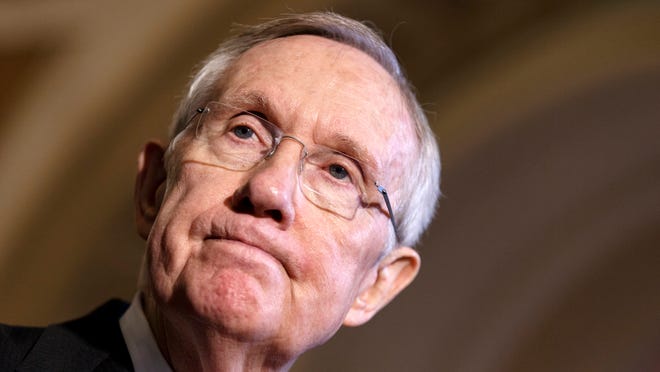Harry Reid leaves Senate with a legacy that will help Trump

WASHINGTON — When President-elect Donald Trump looks to the Senate for confirmation of his Cabinet nominees next year, he'll have outgoing Senate Minority Leader Harry Reid to thank for Democrats' powerlessness to block his choices.
The Nevada Democrat, a fierce Trump opponent who often referred to the president-elect as "a spoiled brat," took dramatic action in 2013 to end Republicans' ability to mount a filibuster to derail President Obama's judicial and Cabinet nominees.
Reid, who was majority leader at the time, used a parliamentary move known as the "nuclear option" to change a nearly 40-year-old Senate rule. The change meant that the Senate now needs only a simple majority of 51 votes — rather than a super-majority of 60 — to proceed to confirmation votes on Cabinet secretaries, agency directors and judges, except for the Supreme Court.
Reid, who leaves a legacy as a master parliamentarian, said he's still glad he did it, despite the fact that the rule change will now be used by the Republican majority to help Trump staff his administration.
"We changed the Senate rules to guarantee a president’s nominees a fair, simple-majority vote," he wrote in a recent op-ed in The New York Times. "I doubt any of us envisioned Donald J. Trump’s becoming the first president to take office under the new rules. But what was fair for President Obama is fair for President Trump."

The change in filibuster rules was just one of the many procedural tactics that Reid employed during his 12 years as Democratic leader to win passage of President Obama's most ambitious goals.
Using the procedural tricks at his disposal, Reid pushed through approval of the Affordable Care Act in 2010 — the "Obamacare" law that Republicans are seeking to dismantle — and the American Recovery and Reinvestment Act in 2009, an $800 billion stimulus bill that sought to lift the country out of recession by creating jobs repairing roads, bridges and highways while also expanding unemployment benefits.
"I’ve done the best that I can,” Reid told reporters last week at his final press briefing before heading home to retire in Nevada. "And I don’t have any regrets whatsoever about my efforts to push forward a Democratic agenda."
Reid will be succeeded in the new Congress by incoming Minority Leader Charles Schumer, D-N.Y., a gregarious, ebullient Brooklynite whose style stands in stark contrast to the tough, taciturn tactician from tiny Searchlight, Nev., who shunned Washington's social life and eschewed small talk.
Reid grew up in a shack made of railroad ties with no running water as his father tried unsuccessfully to make a fortune in mining and his mother made ends meet by washing clothes for the brothels that filled the town. Reid hitchhiked 40 miles to Henderson, Nev., every week just to attend high school.
Read more:
Reid recalls his hardscrabble upbringing
Why Democrats made Harry Reid their leader: Ross K. Baker
Harry Reid calls Trump 'sexual predator' who fueled his campaign with hate
Eventually, Reid made his way out of the town, working as a U.S. Capitol Police officer while attending law school at George Washington University. He was elected to the Nevada Assembly at age 28 and served in a variety of elected offices before being elected to the U.S. House in 1982 and the Senate in 1986.
"I really do believe that if a person like me can be successful, and some can say I have been, then I believe that should make people feel pretty good," Reid said. "If I can make it, why shouldn’t anyone be able to make it?"
Schumer said there is compassion beneath Reid's no-nonsense demeanor.
"Beneath the quietness is a strength and a caringness,” Schumer said. “He’s very strategic and very smart.”
But Reid's unapologetic partisanship has also made him a target of critics.
Wyoming Sen. John Barrasso, chairman of the Senate Republican Policy Committee, said the glowing tributes to Reid ring false.
"For me, his time here has been one of failure, obstruction and gridlock," Barrasso said.
Sen. Dean Heller, R-Nev., said Reid became a lightning rod because he had to be.
"I don’t agree with all the changes that he brought to the Senate," Heller said, referring to McCain's use of the nuclear option. "But he did that because he thought it was necessary for him to be in the leadership position he was in and what he thought would retain (Democratic) control of the United States Senate."

Reid said the one thing he regrets is his support for the U.S. invasion of Iraq during the administration of former president George W. Bush.
"The invasion of Iraq is the worst foreign policy decision in the history of America leading to the death of untold numbers of human beings,” Reid said. "Four hundred thousand Syrians. We have no idea how many Iraqis; some say half a million. Plus all the migration that’s been forced. We destabilized a whole part of the world. So I am terribly, terribly embarrassed that I fell for ... all that stuff."
Reid, who has five children and 19 grandchildren, has not yet decided how to spend his retirement.
"I understand that my influence as a member of government is gone," he said. “I’ll be around for advice or counsel ... but I’m not going to be looking to come back here all the time onto the Senate floor or the cloakroom."
Richardson reports for the Reno Gazette-Journal.